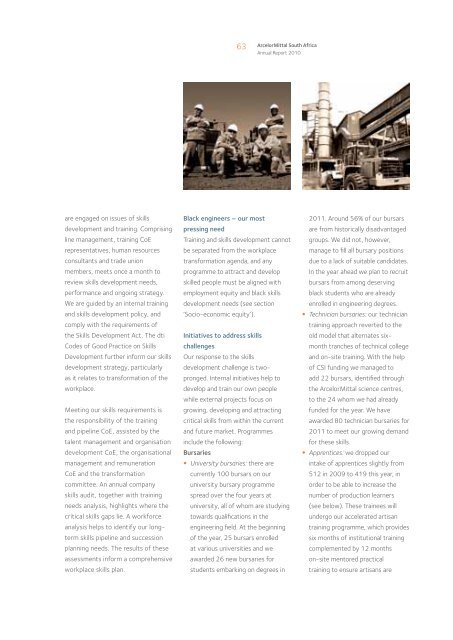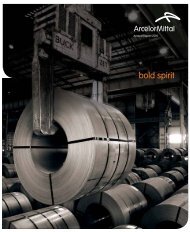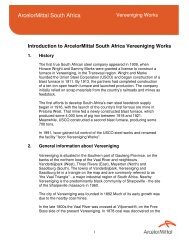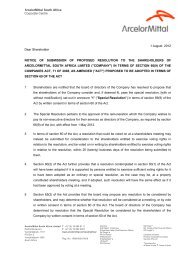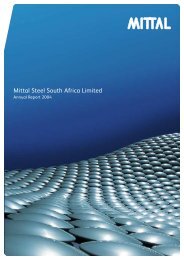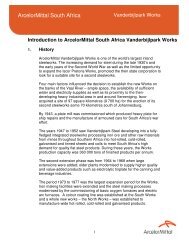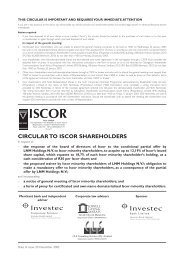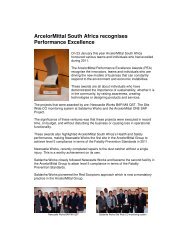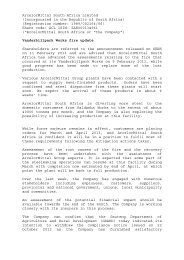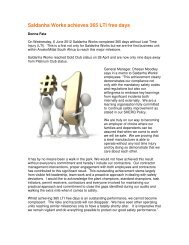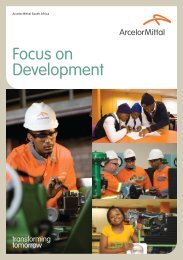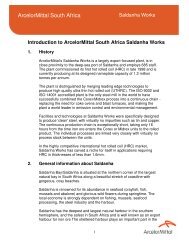bold spirit - ArcelorMittal South Africa
bold spirit - ArcelorMittal South Africa
bold spirit - ArcelorMittal South Africa
Create successful ePaper yourself
Turn your PDF publications into a flip-book with our unique Google optimized e-Paper software.
63<br />
<strong>ArcelorMittal</strong> <strong>South</strong> <strong>Africa</strong><br />
Annual Report 2010<br />
are engaged on issues of skills<br />
development and training. Comprising<br />
line management, training CoE<br />
representatives, human resources<br />
consultants and trade union<br />
members, meets once a month to<br />
review skills development needs,<br />
performance and ongoing strategy.<br />
We are guided by an internal training<br />
and skills development policy, and<br />
comply with the requirements of<br />
the Skills Development Act. The dti<br />
Codes of Good Practice on Skills<br />
Development further inform our skills<br />
development strategy, particularly<br />
as it relates to transformation of the<br />
workplace.<br />
Meeting our skills requirements is<br />
the responsibility of the training<br />
and pipeline CoE, assisted by the<br />
talent management and organisation<br />
development CoE, the organisational<br />
management and remuneration<br />
CoE and the transformation<br />
committee. An annual company<br />
skills audit, together with training<br />
needs analysis, highlights where the<br />
critical skills gaps lie. A workforce<br />
analysis helps to identify our longterm<br />
skills pipeline and succession<br />
planning needs. The results of these<br />
assessments inform a comprehensive<br />
workplace skills plan.<br />
Black engineers – our most<br />
pressing need<br />
Training and skills development cannot<br />
be separated from the workplace<br />
transformation agenda, and any<br />
programme to attract and develop<br />
skilled people must be aligned with<br />
employment equity and black skills<br />
development needs (see section<br />
‘Socio-economic equity’).<br />
Initiatives to address skills<br />
challenges<br />
Our response to the skills<br />
development challenge is twopronged.<br />
Internal initiatives help to<br />
develop and train our own people<br />
while external projects focus on<br />
growing, developing and attracting<br />
critical skills from within the current<br />
and future market. Programmes<br />
include the following:<br />
Bursaries<br />
• University bursaries: there are<br />
currently 100 bursars on our<br />
university bursary programme<br />
spread over the four years at<br />
university, all of whom are studying<br />
towards qualifications in the<br />
engineering field. At the beginning<br />
of the year, 25 bursars enrolled<br />
at various universities and we<br />
awarded 26 new bursaries for<br />
students embarking on degrees in<br />
2011. Around 56% of our bursars<br />
are from historically disadvantaged<br />
groups. We did not, however,<br />
manage to fill all bursary positions<br />
due to a lack of suitable candidates.<br />
In the year ahead we plan to recruit<br />
bursars from among deserving<br />
black students who are already<br />
enrolled in engineering degrees.<br />
• Technician bursaries: our technician<br />
training approach reverted to the<br />
old model that alternates sixmonth<br />
tranches of technical college<br />
and on-site training. With the help<br />
of CSI funding we managed to<br />
add 22 bursars, identified through<br />
the <strong>ArcelorMittal</strong> science centres,<br />
to the 24 whom we had already<br />
funded for the year. We have<br />
awarded 80 technician bursaries for<br />
2011 to meet our growing demand<br />
for these skills.<br />
• Apprentices: we dropped our<br />
intake of apprentices slightly from<br />
512 in 2009 to 419 this year, in<br />
order to be able to increase the<br />
number of production learners<br />
(see below). These trainees will<br />
undergo our accelerated artisan<br />
training programme, which provides<br />
six months of institutional training<br />
complemented by 12 months<br />
on-site mentored practical<br />
training to ensure artisans are


